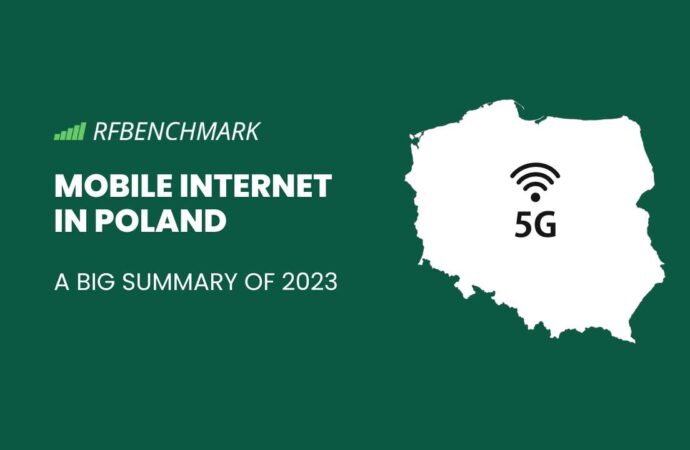As we close the chapter on 2023, we find ourselves looking back at a year filled with political tensions, significant social changes, and economic challenges. However, it was the advancements in technology, especially in artificial intelligence, that truly marked the year. These advancements have opened up new possibilities, with mobile technologies making significant progress and shaping the future in exciting ways.
The past year was an important one for the Polish telecommunications market, especially regarding mobile Internet services. We’ve spent the last twelve months providing detailed monthly reports to our readers, and now we have a complete picture of how mobile Internet in Poland has changed over the year. This article will highlight the key changes and trends in the industry.
Throughout 2023, we collected 6,238,016 pieces of measurement data, which helped us compile twelve monthly summaries. This is a substantial increase from 2022, during which we gathered 2,743,061 data points using the RFBENCHMARK application, showing a clear growth in the use and development of mobile Internet in Poland.
Number of measurements – historical data
Number of RFBENCHMARK application measurements from 2018 to 2023
Number of RFBENCHMARK application measurements by month in 2023
Dynamic growth of 5G interest in Poland during 2023
The year 2023 saw the majority of measurements being carried out using 4G LTE technology, making up 80.53% of all collected data. There was a notable rise in interest towards 5G technology, which constituted 13.49% of the measurements. This marks a significant increase from 2022, when 5G only accounted for 1.89% of measurements. However, it’s important to note that in 2022, 5G technology wasn’t measured throughout the entire year.
According to our annual data, Orange was the leading operator, responsible for 33.2% of all measurements. Play was close behind, accounting for 32% of the data collected. The remaining market shares were held by Plus and T-Mobile, with 18.1% and 16.8%, respectively.
Orange: 2,067,971 Play: 1,995,322 Plus: 1,128,903 T-Mobile: 1,045,820
See also: Mobile Internet in Poland – A big summary of 2022
Quality and speed of mobile Internet in Poland in 2023
5G
Average data download speed: Plus (142.9 Mbps)
In 2023, Plus stood out significantly in the 5G download speed category, delivering an unmatched average speed of 142.9 Mbps, far surpassing its competitors. The peak performance for Plus was observed in January, with speeds reaching 151.8 Mbps, while the lowest was in September, at 136.2 Mbps.
The other operators, while posting similar figures to each other, all recorded speeds below 60 Mbps. T-Mobile secured the second spot in our yearly review with an average speed of 56.4 Mbps, followed closely by Play at 54.4 Mbps. Orange completed the rankings, with a speed just slightly lower at 54 Mbps.
Average data upload speed: Play (37.2 Mbps)
The battle for the top average 5G upload speeds among operators was closely contested. Play led the pack with a speed of 37.2 Mbps, just slightly ahead of T-Mobile, which posted a speed of 36.2 Mbps.
Orange found itself in third place with 34.2 Mbps, trailing the leader by a noticeable margin. Plus was at the bottom of this category, with a speed of 26.9 Mbps.
Lowest ping value: Play (28.1 ms)
When it comes to the lowest average ping values, crucial for real-time applications like online gaming and video conferencing, Play achieved the best performance with a ping of 28.1 ms. T-Mobile was a close second with 29.5 ms, indicating both operators offer quick and reliable connections. Orange, with a ping of 29.9 ms, and Plus, at 32.6 ms, also posted respectable times, which remain within the acceptable range for most online activities.
4G LTE
Average data download speed: T-Mobile (43.8 Mbps)
T-Mobile is the leading operator for average LTE download speeds in 2023, boasting an average speed of 43.8 Mbps. Dominating the field, T-Mobile topped the charts in 11 months, with January 2023 being the only exception when Orange led with a speed of 42.6 Mbps.
The highest speed recorded by T-Mobile was in July, reaching 46.8 Mbps, while its lowest was in October, at 41.3 Mbps.
For the average speeds across 2023, the subsequent rankings were held by Play with 40 Mbps, followed by Orange at 39 Mbps, and Plus at 34.3 Mbps.
Average data upload speed: Play (23.1 Mbps)
Play continues to lead in 4G upload speeds, achieving 23.1 Mbps and showcasing its robust performance in both uploading and downloading data. This marks a significant improvement from 2022, when Play reached 20.6 Mbps.
The competition for second place was tight, with Orange and T-Mobile closely contesting and delivering comparable results. Ultimately, T-Mobile edged out with 20.1 Mbps, slightly ahead of Orange’s 19.6 Mbps. Plus finds itself at the lower end with a speed of 17.5 Mbps.
Lowest ping value: Play (29.6 ms)
Similar to the previous category, Play also topped the LTE ping category in our annual review. With a ping of 29.6 ms, Play rightfully secured the top spot, surpassing Orange at 31.6 ms, and outperforming other operators like T-Mobile and Plus, which recorded pings of 34 ms and 39 ms, respectively.
5G/4G LTE Leaderboard
| 5G | ||||
|---|---|---|---|---|
| Parameter measured | Orange | Play | Plus | T-Mobile |
| Data download speed | 54.0 Mbps | 54.4 Mbps | 142.9 Mbps | 56.4 Mbps |
| Data upload speed | 34.2 Mbps | 37.2 Mbps | 26.9 Mbps | 36.2 Mbps |
| Ping | 29.9 ms | 28.1 ms | 32.6 ms | 29.5 ms |
| Number of measurements | 190818 | 277411 | 215495 | 157800 |
| LTE | ||||
|---|---|---|---|---|
| Parameter measured | Orange | Play | Plus | T-Mobile |
| Data download speed | 39.0 Mbps | 40.0 Mbps | 34.3 Mbps | 43.8 Mbps |
| Data upload speed | 19.6 Mbps | 23.1 Mbps | 17.5 Mbps | 20.1 Mbps |
| Ping | 31.6 ms | 29.6 ms | 39.0 ms | 34.0 ms |
| Number of measurements | 1765586 | 1631987 | 797538 | 828229 |










Leave a Comment
Your email address will not be published. Required fields are marked with *